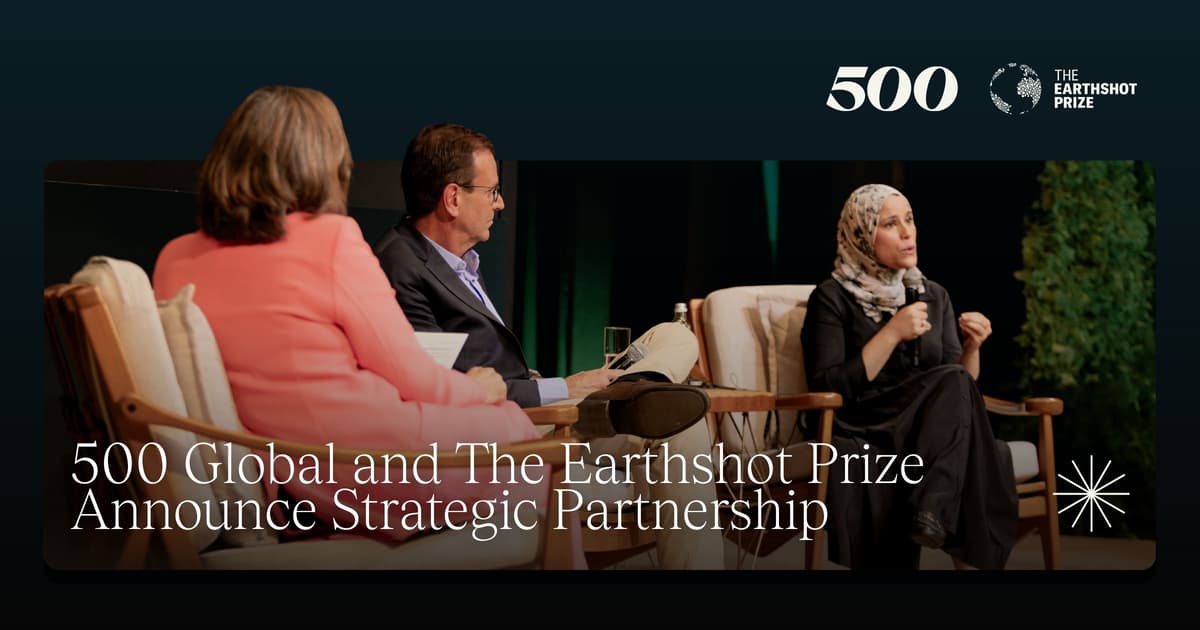Alaina Harkness, Executive Director at Current, joined 500 Global to discuss why early stage companies need to think about water conservation now, and how they can approach stewardship and innovation when it comes to water.
2021.08.04

500 Global Team

Photo by Yoda Adaman on Unsplash
From wildfires raging across the drought stricken western U.S., to extreme floods in Europe and the threat of rising sea levels, challenges and risks abound around the topic of water. As we contend with climate change’s impact, water is already truly a global issue: by 2025 two-thirds of the world’s population could face water shortages.
These are problems the investment and business communities cannot afford to ignore. Consider this: in 2020 over 8,000 suppliers reported through the global environmental disclosure organization CDP that $1.26 trillion in revenue is likely at risk over the next five years due to climate change, deforestation and water security. That could lead corporate buyers to face cost hikes of $120 billion. “Wherever you’re located, I guarantee you’ve got some sort of water challenge on your doorstep,” says Alaina Harkness, Executive Director at Current, a Chicago-based water innovation hub working to grow the blue economy, accelerate innovation and solve pressing water challenges.
Alaina recently joined 500 Startups to discuss why early stage companies need to think about water conservation now, and how they can approach stewardship and innovation when it comes to water. Advances in water technology are certainly going to be important going forward, but this isn’t just an issue for the water business or for mature firms that are heavy water users. “Water creates a lot of risk for your business, even if you’re not a water business,” says Alaina.
These risks look different depending on industry, but still result in operational, regulatory and reputational risks for companies across the board. Obviously, industries that are heavy water users—think agriculture or manufacturing—could face significant financial impacts if prices change and shortages become more acute, but water can also be hidden in a supply chain and create unforeseen exposure. Future regulations and laws could also affect the cost of water and access to it, bringing more penalties.
Meanwhile, around reputation and brand alignment, Alaina highlights the influence of younger generations that are proving to be more environmentally conscious consumers. That will make it harder for companies to escape scrutiny for wasteful or harmful business practices linked to water.
It’s never too early for a startup to begin thinking about water. Alongside avoiding future problems, it can also pave the way for opportunities to innovate and improve bottom lines, from lowering energy consumption to creating more top-line growth through sustainable products. Getting started can be as simple as locating your business in an energy efficient building, or formalizing an environmental, social and governance (ESG) strategy.
Already there are plenty of examples of good water stewardship in the corporate world to consider. Alaina points to Kraft Heinz and Naclo Water, who partnered in 2019 to launch a water recycling project that saved approximately 86 million gallons of water in a year at a single plant. That delivered an annual net cost reduction of around $500,000. Or there’s HP, which decreased its water footprint by 11% last year compared to 2019, by reducing indirect water consumption from electricity generation and paper production associated with its products. Startups are making an impact here too. Alaina highlights Rheaply, a Chicago-based circular economy startup that has a resource management and exchange platform that helps clients reduce energy and water impact and save money.
Crucially, Alaina points out that investors are also eying water issues as part of ESG metrics. About two-thirds of 800 institutional investors surveyed in the US, Canada, Europe and Asia in 2019 said concerns over water factored into investment decisions, third behind cybersecurity and anti-corruption as a top ESG consideration. “The bottom line is that investors are starting to take notice about what companies do with water and how they care about it, whether or not they’re explicitly a water company,” says Alaina.
Luckily, there are many ways entrepreneurs can turn water risk and water conservation into upside. A simple starting point is to map out the way a business uses (or may eventually use) water and figure out how H20 is embedded into supply chains. Founders should also start vetting suppliers and partners around water usage and practices, including asking about disclosures.
That can reveal opportunities to optimize water and energy costs, and ways to reduce impact. Founders should anticipate changes coming down the pipeline–for example, how prices can potentially change in water-starved California–and consider how that could impact a growing business. Founders can then create water conservation goals around reducing both direct and indirect consumption, and hopefully have more market power to achieve these ends as their companies grow.
On the governance front, having sustainability expertise on a board is another way to infuse water conservation into decision-making and strategy. As an early-stage company, it can be a good idea to plan for such a board seat in the future and build a pipeline of prospects. Water metrics can be embedded into business planning and impact measurements, allowing founders to start tracking and communicating these policies and results to stakeholders. Organizations such as CDP can prove useful here for companies looking to understand environmental reporting standards.
When it comes to the social aspect of ESG, tackling water issues is a no-brainer for companies looking to build credibility and contribute positively to the communities where they operate. A way to start is getting involved with local water hubs or nonprofits (like Current in Chicago) to better understand the local landscape.
Ultimately, the challenges and trends around water and conservation are complex and daunting. No one company is capable of solving them alone. But entrepreneurs can and should be taking steps to understand their impact when it comes to water. Doing so can help avoid significant future challenges and create sustainable businesses with more strategic freedom. “There’s a lot of opportunity to attract revenue, attract investment and also just improve your business bottom line if you think about water as built into your business,” says Alaina.
Upcoming ESG Webinars at 500 Startups

Join us on August 4th at 1PM PST, for a discussion with the B-Lab team to understand B-Corp certification and how it affects brand awareness. https://www.eventbrite.com/e/the-stakeholder-governance-playbook-for-startups-tickets-164907866869
This post is intended solely for general informational or educational purposes only. 500 Startups Management Company, L.L.C. and its affiliates (collectively “500 Startups”) makes no representation as to the accuracy or information in this post and while reasonable steps have been taken to ensure that the information herein is accurate and up-to-date, no liability can be accepted for any error or omissions. All third party links in this post have not been independently verified by 500 Startups and the inclusion of such links should not be interpreted as an endorsement or confirmation of the content within. Under no circumstances should any content in this post be construed as investment, legal, tax or accounting advice by 500 Startups, or an offer to sell or solicitation of interest to purchase any securities advised by 500 Startups. Prospective investors considering an investment into any 500 Startups fund should not consider or construe this content as fund marketing material. The views expressed herein are as at the date of this summary and are subject to change without notice. This post includes the views and opinions of independent third parties that are not related to or controlled by 500 Startups. All views and opinions presented herein by such third party participants do not represent those of 500 Startups or any of its affiliates or representatives. 500 Startups makes no representations as to or guarantees of specific outcomes from relying on the contents of this post.









